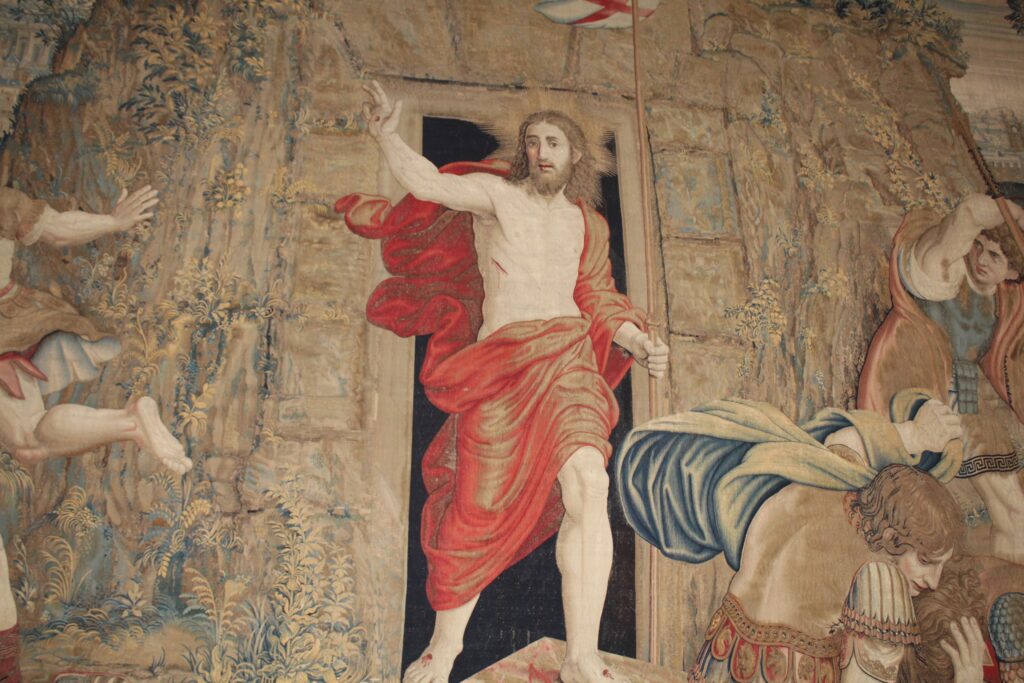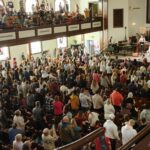
The Hope of Resurrection
I have a confession to make. One of my greatest joys in life comes from tearing down sacred cows and false idols and smashing them with the hammer of truth. Perhaps that’s a bit melodramatic, but what I mean is that even with the Church there are a number of very prevalent ideas which always get passed around as if they were a matter of doctrine, but which actually are not very well attested in Scripture (if at all) and are not even part of our confession of faith.
Case in point: a few years ago I was teaching a group of fifth and sixth graders for Confirmation class. We were on week four or five, so I had already spent some time with them going over the basics of the Christian faith, but this particular day, as I was listening to them ask some very good questions, it finally dawned on me that all of them had something of a wrong notion about God.
“If I asked you to describe God for me, what would you say?” I asked them. The answers did not surprise me.
“Really old.”
“Angry. Like, really wrathful.”
“Long beard, and a robe.”
I dropped the hammer. “What if I told you that God is not really any of those things?” Stunned silence. “Did you know,” I continued, “that God does not have a body?”
They couldn’t believe it. “What do you mean he doesn’t have a body?”
“Just that,” I said. “The Bible says that God is Spirit. He’s not some bearded old man sitting in the clouds, watching us until we make a mistake. He’s invisible. He’s not like any animal or creature that we can see or touch. And he’s not waiting for us to make a mistake, he’s waiting to forgive us.”
You would have thought I told them they were moving to another country. It took a while for it to sink in, what I was telling them.
Then, when I saw that things were starting to click for them and they were really getting it, I dropped another hammer.
“What’s our hope as Christians? That is, what are we looking forward to most in the future?”
The answer was pretty much unanimous. “Heaven.”
“And what if…,” I asked, suppressing my excitement at smashing another false notion, “what if I told you that our hope as Christians ISN’T that when we die we go to Heaven? What if I told you the Bible is more concerned with something else?”
With that question, I temporarily broke them. They stared silently for a while.
“Well, then…what are we looking forward to?”

Most of us have grown up with a specific understanding of what life after death looks like. The prevailing idea, not only in Christianity but in Western culture in general, is that each of us has two main components to who we are: a body, and a soul.
The idea goes that the body and soul go together so long as we are alive in this life. The body is mortal and temporary, while the soul is eternal. When we die, our bodies return to the ground and our souls go to Heaven. End of story.
If you were to ask any random person on the street what Christians believe about life after death, even non-religious people, this is the basic idea that you would get. Along with the sad caricature of God as a grumpy old man, which is something closer to Family Guy than to the Bible, this basic outline of how the world works is baked right into the American conscience.
You don’t have to go far to see it in culture. I like to pull out old Looney Tunes shorts to watch with my kids, and anytime Sylvester the Cat or Elmer Fudd have one too many sticks of dynamite shoved down their pants, the characters find themselves dressed in a white robe with small golden wings, gently floating on a cloud up to Heaven.
More recently, with the secularization of our culture, this idea has become less explicitly Christian, but the idea prevails nonetheless. Think of all the shows about ghosts and spirits. The basic idea in these programs is that the spirit must complete any unfinished business before departing “to the light.”
I remember as a kid watching the show Touched by an Angel with my parents. There was a lot of talk about God, and not a few moral lessons which seemed to be drawn from the New Testament (as well as an angel or two, of course), and the whole point of many episodes was simply to help some poor soul pass into the light after they had died. It was about as 90’s as you could get, and unfortunately I think shows and films like this, although working with good intentions, helped spread quite a bit of incorrect theology.
By now you are probably asking yourself a similar question to what my students asked me. If the Christian hope isn’t about going to Heaven after we die, then what is it?
To put it briefly, the Christian hope is in the resurrection.
One of my favorite moments in the Bible comes in Acts 23. In this story, Paul has returned to Jerusalem and is under arrest. He has been brought before the Sanhedrin for trial. Looking around the room, he sees that some of the men present are Pharisees, and some are Sadducees.
This detail is important. Among other things which separated the two groups of Jewish leaders was their understanding of the resurrection of the dead in the last days. The Pharisees believed that a resurrection would occur, whilst the Sadducees did not.
Paul takes advantage of the situation and cries out, “My brothers, I am a Pharisee, the son of a Pharisee. I stand on trial because of my hope in the resurrection of the dead (Acts 23:6).”
When he says this, a sharp disagreement breaks out between the two groups and ends up becoming violent, completely throwing off the sham proceedings.
I find it hilarious how Paul took advantage of the situation and played both parties of his accusers against one another. But more importantly, we see something of a very simple and concise understanding of Paul’s beliefs. He was there because of his belief in the resurrection.
There is no reason to believe that he was being untruthful when he said this. In Acts 17 it is specifically his belief in the resurrection of the dead which was a turn off for the people of Athens who came to listen to his message.
The message of the resurrection is a key feature found throughout all of Paul’s writings. To the Romans he says, “If we have been united with Him (Christ) like this in death, we will certainly also be united with Him in His resurrection (Romans 6:5).
To the Corinthians he wrote about the resurrection at length. “But if it is preached that Christ has been raised from the dead, how can some of you say that there is no resurrection of the dead? If there is no resurrection of the dead, then not even Christ has been raised. And if Christ has not been raised, our preaching is useless and so is your faith (1 Cor 15:12-14).
What exactly is this teaching about the resurrection of the dead, and how is it different than our American understanding of Heaven?
To answer this we have to go back to the prophecies of the Old Testament. In Genesis 3, at the fall, Adam and Eve receive the penalty of death in their flesh for disobeying God. It is clear from the whole early chapters of the Bible that death was not something God intended for humans to experience. Nevertheless, it became an indelible part of our experience, and the fear of death has ruled over the hearts and minds of people from time immemorial.
Interestingly enough, the covenant God made with Moses and the Israelites was never meant to counteract the curse. The covenant made provisions for the forgiveness of sins and helped form Israel as a holy nation, but death was very much a continuing reality for God’s people.
It was not until the prophets began to speak about the coming Kingdom of God that we catch a glimpse of God’s ultimate purpose for humanity. Isaiah speaks of God’s Kingdom in this way:
On this mountain He will destroy the should that enfolds all peoples,
The sheet that covers all nations; He will swallow up death forever.
The Sovereign LORD will wipe away the tears from all faces;
He will remove the disgrace of His people from all the earth.
The LORD has spoken. (Isa 25:7-8)
God’s Kingdom is not simply a matter of establishing a new political order. God’s purpose, Isaiah says, is to destroy death itself.
We receive another glimpse of this promise in the book of Ezekiel. In chapter 37 God gives the prophet a vision of a valley of dry bones. As Ezekiel walks back and forth among the remnants of the dead, God asks him a question: “Son of man, can these dry bones live?”
Ezekiel answers, “O Sovereign LORD, you alone know.” With that, God instructs Ezekiel to prophesy to the bones, and as he speaks the bones collect themselves, muscle and tendons appear, and the valley is suddenly filled with the bodies of the living once more.
These passages offer us a glimpse into the bright future God has planned for humanity. They are the foundation for many of the beliefs that were swirling around the religious and political scene of first century Judaism. And it was in this context that the Gospel message, the message that Jesus was the long-awaited Messiah who had been crucified and then raised to life, found its perfect home.
Because Christ, risen from the dead, seated with the Father in power, was the core element of the good news. The early church understood that through His death and resurrection, the promised Kingdom of God had been inaugurated. Death now stood defeated. In His glory and victory Christ now gave eternal life to any who would draw near to Him in faith.
The resurrection of Jesus brought with it the hope of a future resurrection, when all Christ-followers would rise and inherit the Kingdom together. Christ was the first fruits, the beginning of a wonderous transformation which would sweep the entire cosmos and restore the whole of the created order in the glory of God. This is the promise of a New Heavens and a New Earth (Rev 21:1). It is the promise of the restoration of all things, and Christians confess this hope in the Apostle’s Creed with the simple phrase, “I believe in the resurrection of the body and the life everlasting.”

An obvious question to all of this is, what happens, then, after we die? Interestingly, the New Testament does not speak to this very much. Paul said that if we die, we die to the Lord. There seems to be the understanding that our spirits do in fact return to God’s presence after death, with Christ even calling this “Paradise” to the repentant thief on the cross. Yet even here, not much is said and instead the focus immediately shifts to the notion that when Christ returns, the spirits of all those who have gone before us will return with Him. The main point is that at the last day, Christ will come to establish Heaven on earth and the dead will be raised.
We need to reclaim this robust hope which is so central to the Christian faith. It is not simply the hope that our souls will one day depart to another, better place. This simple view does not do justice to the grand vision God has for His creation.
Because if we only ever teach that we are souls who will go off to Heaven one day, where does that leave the body? Where does that leave the earth, which God said was very good? (Gen 1:31) This type of hope only speaks about departure. It gives us the cold confidence that one day we will escape the troubles of this world.
Resurrection is wholly different. The resurrection speaks about a Savior who has not abandoned the world He created. It does not speak of escape, but of full restoration. At the resurrection all the pains and troubles of this world will be fully swept up into God’s glorious future. Our bodies are not disposable. They are created goods which were meant to reflect the glory and image of God. Although sin has marred that image and kept us enslaved to death, through the death and resurrection of Christ we will once more live into the majestic purpose for which we were created, and will reflect the glory of God as the bride of Christ.
The resurrection teaches us that God has not abandoned any part of His creation. It assures us that what we do matters, not because the natural end result of our actions and intentions will ultimately lead to good, but because in the end God will break through time and space and bring the goodness of Heaven to earth.
Our hope is in the resurrection. We believe that since Christ died, we too can die to sin through faith in Him. And since Christ has risen from the grave, we know that we, too, will one day rise and receive an eternal inheritance which will neither spoil nor fade.
Come, Lord Jesus.





Enriching and edifying message. Thank you for sharing.
This was a great post. It really makes me look differently at the meaning of the resurrection. Jesus says HE is the resurrection, so everything that occurs will be done through him and there is no other way but Him. Praise God!
Pingback: Best Laid Plans - Numinous Writ